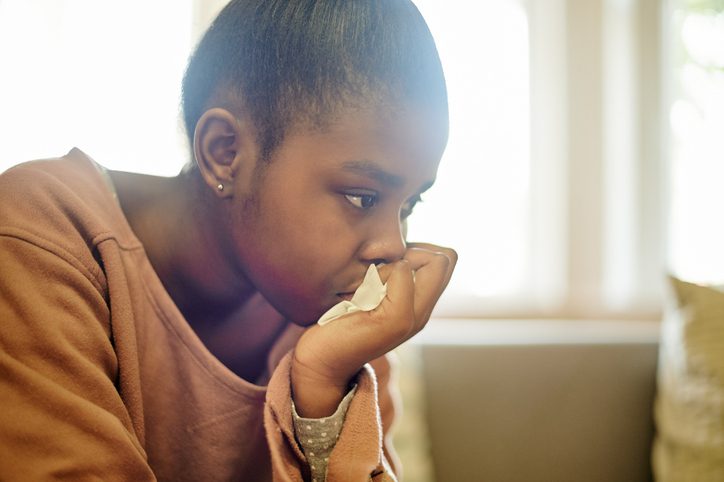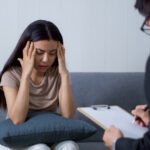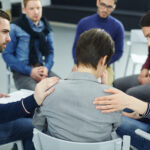It is a normal part of the human experience to feel sad sometimes. Disappointing, upsetting, or painful things can trigger feelings of sadness. Sometimes, such events are labeled as depressing. How can you tell the difference between a typical level of sadness and a diagnosis of depression?
That’s Just Sad
A person who is just feeling sad about an emotionally painful experience might exhibit the following:
- Crying
- Spending more time alone
- No change in sleep habits
- No change in appetite
- No change in ability to participate in work, school, and other life activities
- Typically starts to feel better in a few days or weeks
More Than Sadness
A person who is struggling with the mental health diagnosis of depression will look different from someone who is just feeling sad:
- Sadness, anger, guilt, anxiety, hopelessness, helplessness, and irritability could all be present and are likely to be far more intense than for a person who is just sad
- Symptoms last longer than two weeks
- Changes to sleep and appetite are common
- Loss of interest in previously enjoyable activities
- May be noticeably slower when they speak or move
- May experience thoughts of self-harm or suicide
Getting Help for Depression
Depression is the most common mental health diagnosis, impacting up to 20 percent of adults at some point in their life. Depression is treatable and, like other mental health diagnoses, can be easy to recover from with immediate professional help. Getting professional help for depression could include:
- Reaching out to one’s primary care doctor to assess for medical causes of symptoms and possible referral to mental health services
- Self-referring for mental health treatment
- Calling or texting 988 or another crisis line for more acute mental health concerns
- Calling 911 or going to the nearest emergency room if one is considering and has a plan to attempt suicide
How is Depression Treated?
If a person is diagnosed with depression, a number of different treatments are possible, depending on the person’s age and the severity of their symptoms.
- Medications – A number of medications have been found to be effective for adults. These are less likely to be used for children, due to lack of evidence of their effectiveness for that age group, and for older adults, who may accidentally overdose if they cannot remember how much medication they’ve taken. The medication families that are most often used to treat depression include:
- Selective serotonin reuptake inhibitors (SSRIs) and serotonin-norepinephrine reuptake inhibitors (SNRIs)– Doctors often start here because these medications usually have fewer negative side effects.
- Atypical antidepressants – These may be prescribed if the depression is resistant to other kinds of antidepressants. They have different side effects than SSRIs and SNRIs.
- Tricyclic antidepressants – These meds can have some pretty severe side effects, so doctors usually want to try other options first.
- Monoamine oxidase inhibitors (MAOIs) –These meds can also have some pretty severe side effects, so doctors try other options first. These meds can have serious, even fatal interactions with foods, herbal supplements, and other medications.
- Other medications – Doctors may prescribe a combination of two antidepressants, a mood stabilizer, or antipsychotic drug. Anti-anxiety and stimulant medications may also be used sometimes.
- Therapy – Several different types of mental health therapy have been found to work well for people who struggle with depression:
- Cognitive-behavioral therapy (CBT)
- Interpersonal psychotherapy (IPT)
- Mindfulness-based cognitive therapy (MBCT)
- Psychodynamic therapy
- Supportive therapy
- Group-Life review/reminiscence therapy (for older adults)
- Brain Stimulation Therapies – These options are not typically available until all other options have been exhausted because they can have severe side effects, such as memory loss:
- Electroconvulsive Therapy (ECT) – electrical impulses are sent into the brain
- Repetitive Transcranial Magnetic Stimulation (rTMS) – magnets are used to activate parts of the brain
- Vagus Nerve Stimulation – an implanted device sends electrical impulses to a nerve near the brainstem
Self-Care for Depression
While it is important for people with depression to receive professional help, self-care can also help make depression more manageable.
- Avoiding alcohol and recreational drugs
- Managing stress – mediation, exercise, deep breathing, and journaling are all great options for stress management
- Having good sleep habits
- Setting goals and trying new things – this provides something to look forward to and a sense of accomplishment
- Eating a well-balanced diet
If you are worried that you or a loved one might be struggling with depression, the team at Highland Hospital in West Virginia is happy to answer questions or schedule an appointment to determine what help might be needed.










